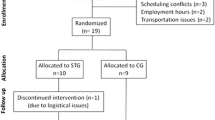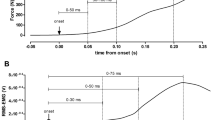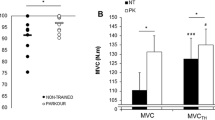Abstract
The aim of this study was to characterize the effect of a 5 km running time trial on the neuromuscular properties of the plantar flexors. Eleven well-trained triathletes performed a series of neuromuscular tests before and immediately after the run on a 200 m indoor track. Muscle activation (twitch interpolation) and normalized EMG activity were assessed during maximal voluntary contraction (MVC) of plantar flexors. Maximal soleus H-reflexes and M-waves were evoked at rest (i.e. H MAX and M MAX, respectively) and during MVC (i.e. H SUP and M SUP, respectively). MVC significantly declined (−27%; P < 0.001) after the run, due to decrease in muscle activation (−8%; P < 0.05) and M MAX-normalized EMG activity (−13%; P < 0.05). Significant reductions in M-wave amplitudes (M MAX: −13% and M SUP: −16%; P < 0.05) as well as H MAX/M MAX (−37%; P < 0.01) and H SUP/M SUP (−25%; P < 0.05) ratios occurred with fatigue. Following exercise, the single twitch was characterized by lower peak torque (−16%; P < 0.001) as well as shorter contraction (−19%; P < 0.001) and half-relaxation (−24%; P < 0.001) times. In conclusion, the reduction in plantar flexors strength induced by a 5 km running time trial is caused by peripheral adjustments, which are attributable to a failure of the neuromuscular transmission and excitation–contraction coupling. Fatigue also decreased the magnitude of efferent motor outflow from spinal motor neurons to the plantar flexors and part of this suboptimal neural drive is the result of an inhibition of soleus motoneuron pool reflex excitability.



Similar content being viewed by others
References
Aagaard P, Simonsen EB, Andersen JL, Magnusson P, Dyhre-Poulsen P (2002) Neural adaptation to resistance training: changes in evoked V-wave and H-reflex responses. J Appl Physiol 92:2309–2318
Abe D, Yanagawa K, Yamanobe K, Tamura K (1998) Assessment of middle distance running performance in sub-elite young runners using energy cost of running. Eur J Appl Physiol 77:320–325
Allen GM, Gandevia SC, McKenzie DK (1995) Reliability of measurements of muscle strength and voluntary activation using twitch interpolation. Muscle Nerve 18:593–600
Allen DG, Lamb GD, Westerblad H (2008) Skeletal muscle fatigue: cellular mechanisms. Physiol Rev 88:287–332
Avela J, Kyröläinen H, Komi PV, Rama D (1999) Reduced reflex sensitivity persists several days after long-lasting stretch–shortening cycle exercise. J Appl Physiol 86:1292–1300
Bigland-Ritchie B, Jones DA, Woods JJ (1979) Excitation frequency and muscle fatigue: electrical responses during human voluntary and stimulated contractions. Exp Neurol 64:414–427
Dietz V (1992) Human neuronal control of automatic functional movements: interaction between central programs and afferent input. Physiol Rev 72:33–69
Farina D, Merletti R, Enoka RM (2004) The extraction of neural strategies from the surface EMG. J Appl Physiol 96:1486–1495
Finni T, Kyröläinen H, Avela J, Komi PV (2003) Maximal but not submaximal performance is reduced by constant-speed 10 km run. J Sports Med Phys Fitness 43:411–417
Fuglevand AJ, Zackoaski MM, Huey KA, Enoka RM (1993) Impairment of neuromuscular propagation during human fatiguing contractions at submaximal forces. J Physiol 460:549–572
Girard O, Racinais S, Micallef J-P, Millet GP (2011) Spinal modulations accompany peripheral fatigue during prolonged tennis playing. Scand J Med Sci Sports 21:455–464
Joyner MJ, Coyle EF (2008) Endurance exercise performance: the physiology of champions. J Physiol 586:35–44
Jubeau M, Zory R, Gondin J, Martin A, Maffiuletti NA (2006) Late neural adaptations to electrostimulation resistance training of the plantar flexor muscles. Eur J Appl Physiol 98:202–211
Kent-Braun JA (1999) Central and peripheral contributions to muscle fatigue in humans during sustained maximal effort. Eur J Appl Physiol 80:57–63
Klitgaard H, Ausoni S, Damiani E (1989) Sarcoplasmic reticulum of human skeletal muscle: Age-related changes and effect of training. Acta Physiol Scand 137:23–31
Martin V, Kerhervé H, Messonnier L, Banfi J-C, Geyssant A, Bonnefoy R, Féasson L, Millet GY (2010) Central and peripheral contributions to neuromuscular fatigue induced by a 24 g treadmill run. J Appl Physiol 108:1224–1233
Metzger JM, Moss RL (1990) Effects of tension and stiffness due to reduced pH in mammalian fast- and slow-twitch skinned skeletal muscle fibres. J Physiol 428:737–750
Millet GY, Lepers R (2004) Alterations of neuromuscular function after prolonged running, cycling and skiing exercises. Sports Med 34:105–116
Millet GP, Jaouen B, Borrani F, Candau R (2002a) Effects of concurrent endurance and strength training on running economy and VO2 kinetics. Med Sci Sports Exerc 34:1351–1359
Millet GY, Lepers R, Maffiuletti NA, Babault N, Martin V, Lattier G (2002b) Alterations of neuromuscular function after an ultramarathon. J Appl Physiol 92:486–492
Millet GY, Martin V, Martin A, Vergès S (2011a) Electrical stimulation for testing neuromuscular function: from sport to pathology. Eur J Appl Physiol. doi:10.1007/s00421-011-1996-y
Millet GY, Tomazin K, Vergès S, Vincent C, Bonnefoy R, Boisson R-C, Gergelé L, Féasson L, Martin V (2011b) Neuromuscular consequences of an extreme mountain ultra-marathon. PLOS One 6:e17059
Nicol C, Avela J, Komi PV (2006) The stretch–shortening cycle: a model to study naturally occuring neuromuscular fatigue. Sports Med 36:977–999
Nummela AT, Paavolainen LM, Sharwood KA, Lambert MI, Noakes TD, Rusko HK (2006) Neuromuscular factors determining 5 km running performance and running economy in well-trained athletes. Eur J Appl Physiol 97:1–8
Nummela AT, Heath KA, Paavolainen LM, Lambert MI, St Clair Gibson A, Rusko HK, Noakes TD (2008) Fatigue during a 5 km running time trial. Int J Sports Med 29:738–745
Paavolainen L, Häkkinen K, Hämäläinen I, Nummela A, Rusko H (1999) Explosive-strength training improves 5 km running time by improving running economy and muscle power. J Appl Physiol 86:1527–1533
Perrey S, Racinais S, Saimouaa K, Girard O (2010) Neural and muscular adjustments following repeated running sprints. Eur J Appl Physiol 109:1027–1036
Place N, Lepers N, Deley G, Millet GY (2004) Time course of neuromuscular alterations during a prolonged running exercise. Med Sci Sports Exerc 36:1347–1356
Racinais S, Girard O, Micallef JP, Perrey S (2007) Failed excitability of spinal motoneurons induced by prolonged running exercise. J Neuro physiol 97:596–603
Rassier DE, Herzog W (2002) Effects of pH on the length-dependent twitch potentiation in skeletal muscle. J Appl Physiol 92:1293–1299
Rice CL, Cunningham DA, Paterson DH, Dickinson JR (1993) Strength training alters contractile properties of the triceps brachii in men aged 65–78 years. Eur J Appl Physiol 66:275–280
Rupp T, Girard O, Perrey S (2010) Redetermination of the optimal intensity modifies resting H-reflex recovery after a sustained moderate-intensity muscle contraction. Muscle Nerve 41:642–650
Saldanha A, Nordlund Ekblom MM, Thorstensson A (2008) Central fatigue affects plantar flexor strength after prolonged running. Scand J Med Sci Sports 18:383–388
Schieppati M (1987) The Hoffmann reflex: a means of assessing spinal reflex excitability and its descending control in man. Prog Neurobiol 28:345–376
Sinoway LI, Hill JM, Pickar JG, Kaufman MP (1993) Effects of contraction and lactic acid discharge on group III muscle afferents in cats. J Neurophysiol 69:1053–1059
Tomazin K, Morin JB, Strojnik V, Podpecan A, Millet GY (2011) Fatigue after short (100 m), medium (200 m) and long (400 m) treadmill sprints. Eur J Appl Physiol [epub ahead of print]
Vollestad NK (1997) Measurement of human muscle fatigue. J Neuro Methods 74:219–227
Zehr PE (2002) Considerations for use of the Hoffmann reflex in exercise studies. Eur J Appl Physiol 86:455–468
Acknowledgments
The authors thank Benjamin Pernet and Frank Bignet (French Federation of Triathlon) for assistance in data collection. They thank the athletes for their participation.
Author information
Authors and Affiliations
Corresponding author
Additional information
Communicated by Alain Martin.
Rights and permissions
About this article
Cite this article
Girard, O., Millet, G.P., Micallef, JP. et al. Alteration in neuromuscular function after a 5 km running time trial. Eur J Appl Physiol 112, 2323–2330 (2012). https://doi.org/10.1007/s00421-011-2205-8
Received:
Accepted:
Published:
Issue Date:
DOI: https://doi.org/10.1007/s00421-011-2205-8




